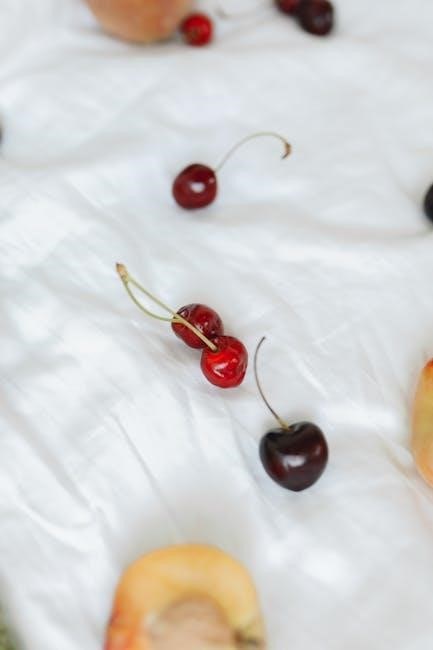Understanding Puberty and Body Changes
Puberty brings significant physical and emotional changes for girls, including growth spurts, breast development, and hormonal shifts․ It’s a natural process that shapes their transition into young adulthood․
1․1 Physical Changes During Puberty

During puberty, girls experience significant physical changes․ Growth spurts occur, with height and weight increasing rapidly․ Breast development begins, and hips widen, leading to a more feminine silhouette․ Pubic and underarm hair appears, and hormonal fluctuations cause oily skin or acne․ Menstruation starts, marking a major milestone․ These changes vary in timing and pace for each girl but are natural steps toward womanhood․ Understanding these transformations helps girls navigate this phase with confidence and prepare for the responsibilities of young adulthood․
- Growth spurts and increased height/weight․
- Development of breasts and curves․
- Appearance of pubic and underarm hair․
- Onset of menstruation․
- Hormonal changes affecting skin․
These changes are natural and unique to each individual, shaping their transition into womanhood․
1․2 Emotional Changes and Mood Swings
Puberty often brings emotional changes and mood swings due to hormonal fluctuations․ Girls may experience heightened emotions, feeling sad, angry, or happy without clear reasons․ This sensitivity can be challenging but is a normal part of development․ Self-esteem may fluctuate as they navigate body changes and social pressures․ Open communication with trusted adults and friends can provide support during this emotional rollercoaster․ Understanding these changes helps girls cope and build resilience for the future․
- Hormonal shifts causing mood swings․
- Increased emotional sensitivity․
- Fluctuations in self-esteem․
- Need for support and communication․
- Building resilience for future challenges․
These emotional changes are temporary and part of growing into a confident individual․
1․3 Hygiene Tips for Teenage Girls
During puberty, maintaining good hygiene is essential for health and confidence․ Girls should shower daily, using mild soap and shampoo, and pay attention to areas prone to odor․ Wearing clean clothes and using deodorant or antiperspirant helps manage body odor․ Menstrual hygiene is crucial—changing pads, tampons, or menstrual cups regularly prevents discomfort and infections․ Keeping nails clean, brushing teeth twice a day, and washing hands frequently are also important․ Encourage using gentle skincare products to address acne and maintain a fresh appearance․ Developing these habits early fosters a lifelong routine of self-care and personal cleanliness․
- Daily showers with mild products․
- Regular use of deodorant․
- Proper menstrual hygiene practices․
- Daily changing of clothes․
- Frequent handwashing․
These simple steps help teenage girls feel clean, confident, and prepared for daily life․

Building Self-Esteem and Confidence
Building self-esteem and confidence involves fostering a positive mindset, celebrating strengths, and setting achievable goals to empower girls to embrace their uniqueness and pursue their aspirations․
2․1 How to Develop a Positive Body Image

Developing a positive body image begins with self-acceptance and self-compassion․ Encourage girls to embrace their unique qualities and recognize that all bodies are different and valuable․ Foster a mindset that celebrates strength, health, and individuality rather than unrealistic standards․ Teach them to focus on what their bodies can do, rather than how they look․ Promote positive affirmations, self-care routines, and surround them with supportive environments․ Encourage open conversations about body image and help them challenge societal pressures and negative stereotypes․ Building confidence starts with loving and respecting oneself just as they are․
2․2 Coping with Peer Pressure and Criticism
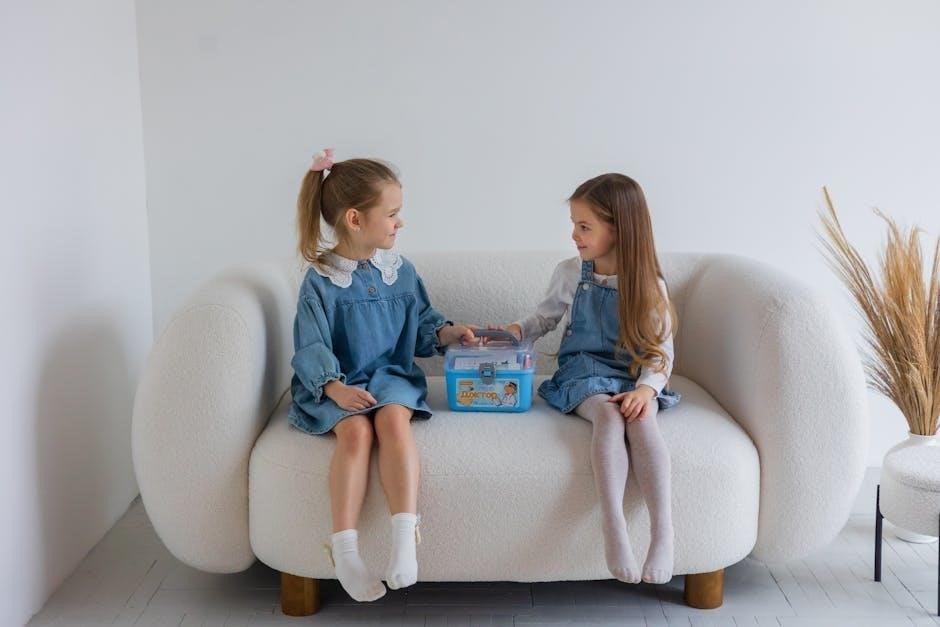
Coping with peer pressure and criticism requires resilience and self-awareness․ Teach girls to identify their values and stand firm in their beliefs, even when faced with negative opinions․ Encourage open communication about their feelings and experiences․ Role-play assertive responses to help them practice saying “no” or expressing disagreement confidently․ Remind them that criticism doesn’t define their worth and that it’s okay to seek support from trusted adults or friends․ Foster a growth mindset, emphasizing that challenges are opportunities to learn and grow stronger․ Surrounding themselves with positive, supportive peers can also help build their confidence and resilience․
2․3 The Power of Positive Thinking
Positive thinking is a powerful tool that helps girls navigate challenges with confidence․ By focusing on positive affirmations and reframing negative thoughts, they can build resilience and self-belief․ Encourage girls to practice gratitude daily, whether through journaling or sharing appreciations with others․ Teach them to challenge self-criticism by replacing unkind thoughts with compassionate ones․ Positive thinking fosters a growth mindset, helping them view setbacks as opportunities to learn․ Surrounding themselves with supportive people and celebrating small achievements can further reinforce this mindset․ Cultivating positivity helps girls develop a stronger sense of self and approach life with optimism and confidence․

Navigating Relationships
Navigating relationships involves building healthy connections with family, friends, and peers․ Open communication, empathy, and respect are key to fostering strong, supportive bonds․ Understanding boundaries and managing conflicts can help girls maintain balanced relationships during their formative years․
3․1 Communicating Effectively with Family and Friends
Effective communication is key to building strong relationships with family and friends․ Active listening, expressing feelings honestly, and using clear language fosters trust and understanding․ Girls should practice using “I” statements to share their thoughts without blaming others․ Asking open-ended questions encourages meaningful conversations and shows interest in others’ feelings․ Empathy and respect are vital, even during disagreements․ Learning to navigate conflicts calmly and seeking solutions together strengthens bonds․ Open communication helps girls feel supported and valued, creating a foundation for lifelong healthy relationships․
3․2 Understanding Crushes and First Relationships
Having crushes is a natural part of growing up, and it’s okay to feel excited or nervous․ When entering first relationships, it’s important to communicate openly about feelings, boundaries, and expectations․ Respect and trust are the foundation of any healthy relationship; Take time to get to know someone and ensure mutual understanding․ Remember, your worth isn’t defined by a relationship—stay true to yourself․ If things don’t work out, it’s a learning experience that helps you grow․ Always seek advice from trusted friends, family, or mentors, and prioritize your happiness and well-being in any relationship․
3․3 Setting Healthy Boundaries
Setting healthy boundaries is essential for maintaining respect and balance in relationships․ It’s important to clearly communicate your limits and expectations to others while listening to theirs․ Boundaries help protect your time, emotions, and personal space․ Practice saying “no” when necessary and stand firm in your decisions․ Healthy boundaries foster mutual respect and trust, allowing relationships to grow stronger․ Remember, asserting your needs doesn’t make you selfish—it shows self-respect․ Be open to compromise but never compromise your values or comfort level․ Learning to set boundaries early helps you navigate relationships confidently and maintain emotional well-being․

Health and Wellness
Prioritizing health and wellness is crucial during adolescence․ Regular physical activity, balanced nutrition, and mental health care support overall well-being, helping girls grow into strong, confident individuals․
4․1 Importance of Regular Exercise
Regular exercise is vital for teenage girls, promoting physical and mental health․ It strengthens bones, improves heart health, and boosts energy levels․ Exercise helps maintain a healthy weight, reducing the risk of chronic diseases later in life․ Additionally, physical activity releases endorphins, which uplift mood and reduce stress or anxiety․ Engaging in sports or workouts fosters teamwork, self-discipline, and confidence․ It also provides opportunities to make friends and develop social skills․ Encouraging a habit of regular exercise early on sets the foundation for a lifelong commitment to wellness and self-care, empowering girls to embrace a healthy, active lifestyle as they grow․
4․2 Balanced Nutrition for Growing Bodies
A balanced diet is crucial for teenage girls to support growth and overall health․ Nutrient-rich foods, including proteins, vitamins, and minerals, ensure proper development․ Incorporate lean meats, fish, eggs, and legumes for protein, and whole grains, fruits, and vegetables for fiber and vitamins․ Calcium and iron are especially important for bone health and energy․ Healthy fats, like those in nuts and avocados, support brain function․ Limit sugary and processed foods to maintain a healthy weight and prevent energy crashes․ Staying hydrated with water is also essential․ A well-rounded diet helps fuel active lifestyles, supports mental well-being, and sets the foundation for lifelong health habits․
4․3 Mental Health and Stress Management
Mental health is as important as physical health during adolescence․ Teenage girls often face stress from school, peer pressure, and body changes․ It’s crucial to recognize signs of anxiety or sadness and seek support․ Mindfulness, deep breathing, and physical activity can help manage stress․ Open conversations with trusted adults or friends can provide relief․ Building a healthy routine, including adequate sleep and downtime, fosters emotional well-being․ Remember, it’s okay to ask for help from counselors or professionals if feelings become overwhelming․ Prioritizing mental health ensures a stronger, happier you as you navigate the challenges of growing up․
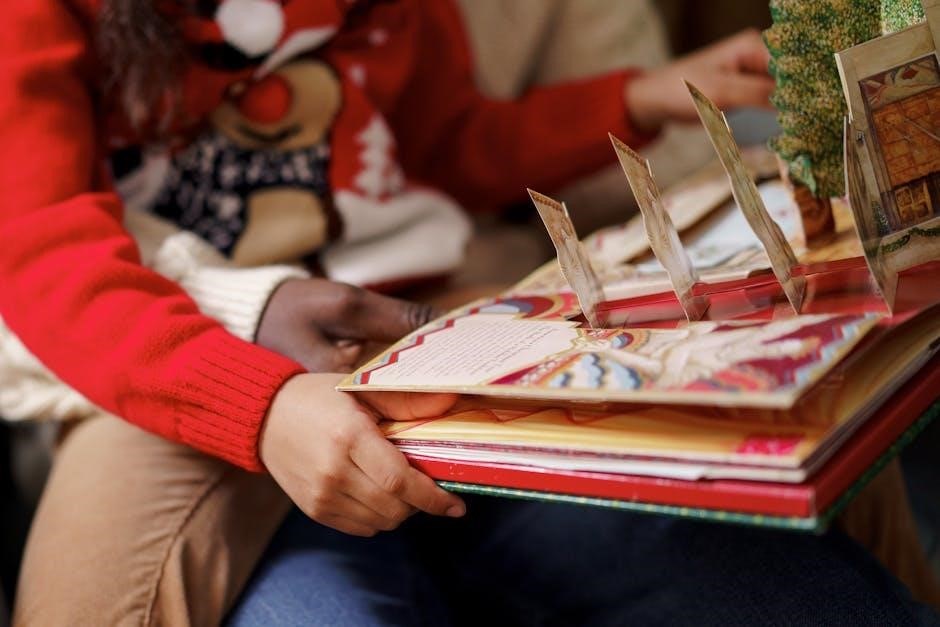
Education and Future Goals
Education is a powerful tool for shaping your future․ Setting clear academic and personal goals helps you stay focused and motivated․ Prioritize learning, explore your interests, and develop skills that will empower you to achieve your aspirations․ A strong educational foundation opens doors to opportunities, fostering independence and confidence․ Remember, every step you take today builds the path to your tomorrow․
5․1 Setting Academic and Personal Goals
Setting clear academic and personal goals is essential for guiding your growth and development․ Start by identifying what you want to achieve in both school and life․ Break down larger goals into smaller, manageable steps to help you stay focused․ For example, if you want to improve your grades, set specific targets like dedicating extra time to studying or seeking help when needed․ Use tools like planners or apps to track your progress․ Celebrate your successes, no matter how small, and be flexible to adjust your goals as your priorities evolve․ Remember, your goals are a roadmap to shaping your future․
5․2 Time Management and Study Tips
Mastering time management and effective study habits is crucial for balancing school and personal life․ Start by prioritizing tasks, focusing on the most important ones first․ Create a daily schedule that allocates specific times for studying, homework, and leisure activities․ Use tools like planners or digital calendars to stay organized․ Avoid procrastination by breaking tasks into smaller, manageable chunks․ Practice active learning techniques, such as summarizing notes or teaching concepts to others․ Regular breaks can refresh your mind and improve focus․ By staying consistent and adaptable, you’ll develop habits that support long-term success and reduce stress․
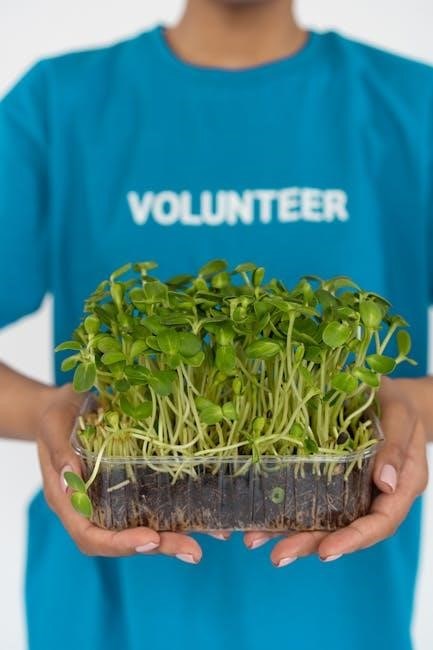
5․3 The Importance of Education for Girls
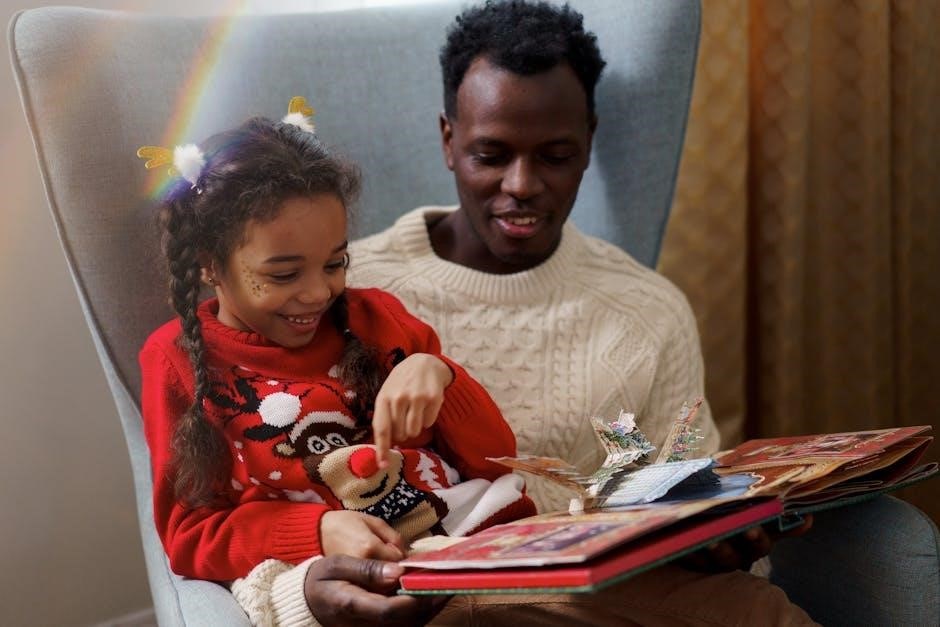
Education is a powerful tool for empowering girls, fostering independence, and breaking cycles of inequality․ It equips them with knowledge, critical thinking, and confidence to navigate life’s challenges․ Educated girls are more likely to pursue careers, earn higher incomes, and contribute positively to their communities․ Education also promotes gender equality by challenging stereotypes and providing opportunities for leadership․ Investing in girls’ education creates a ripple effect, benefiting families, societies, and future generations․ It’s a cornerstone for personal and societal progress, ensuring girls grow into capable, informed, and influential women who can shape their own futures and inspire others․



